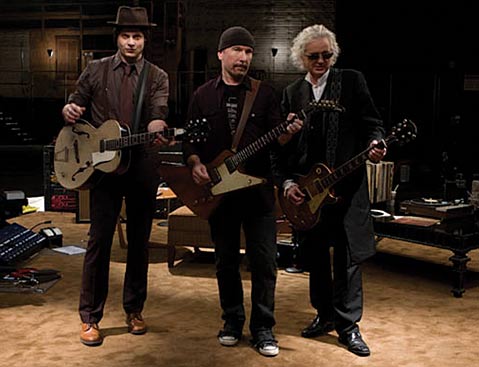It Might Get Loud
Jimmy Page, The Edge, and Jack White Star in a Film Directed by Davis Guggenheim

For anyone who has bought into the idea of fetishizing and even sexualizing the electric guitar, It Might Get Loud is bound to strike a chord or three. This is the deceptively linear-seeming and celebrity-fueled film where Jimmy (Page) meets Jack (White) meets The Edge, and some essential truths about the soul and meaning of the electric guitar in culture during the past 50 years are delivered in the course of two hours.
Let’s face it: Many rock docs tend to follow patterns of dull sameness, suffering from the built-in expressive discordance between words and images about a culture and the cultural thing itself. But It Might Get Loud gets loud and deep in surprisingly intriguing and illuminating ways, partly through the beauty of the three-way, compare-and-contrast mode of the storytelling process.
Although the ostensible center of director Davis Guggenheim’s focus is the summit meeting of three acknowledged living guitar heroes, the more telling material comes from the sideline stories and history-hopping encounters with each character. We travel to White’s hometown of Detroit, to The Edge’s Irish outposts and high school (the birthplace of U2), and get Page’s past, from his life as a neatly coiffed skiffle player, unlikely session man, and iconoclastic guitar star. Along the narrative path, Guggenheim touches base with cherished guitars (The Edge’s Explorer, White’s Kay, Page’s Stratocaster), favorite songs, and the players’ own classic creations.
In this film, Page almost inevitably steals the show, partly because of his enigmatic public presence and his massively influential stamp as a guitar innovator and nonpareil riff-maker. Despite the indisputable importance of White, through the White Stripes, The Raconteurs, and more, and The Edge’s ethereal effects-laden sonics, they have been gabby, media-savvy and conceptual figures who know how to talk their talk.
Page, though, who virtually closed up creative shop with the 1980 death of Led Zeppelin drummer John Bonham, comes from a more mystical place, and the greatest scenes in this film bring us closer to his brilliance: watching him listen and instinctively react to one of his seminal favorites, Link Wray’s “Rumble,” play the mandolin riff to “The Battle of Evermore” in the rambling yard of Hadley Grange, and then jam with his guitar brethren on the classic “In My Time of Dying.” These are the moments making this film worth more than the price of admission.



